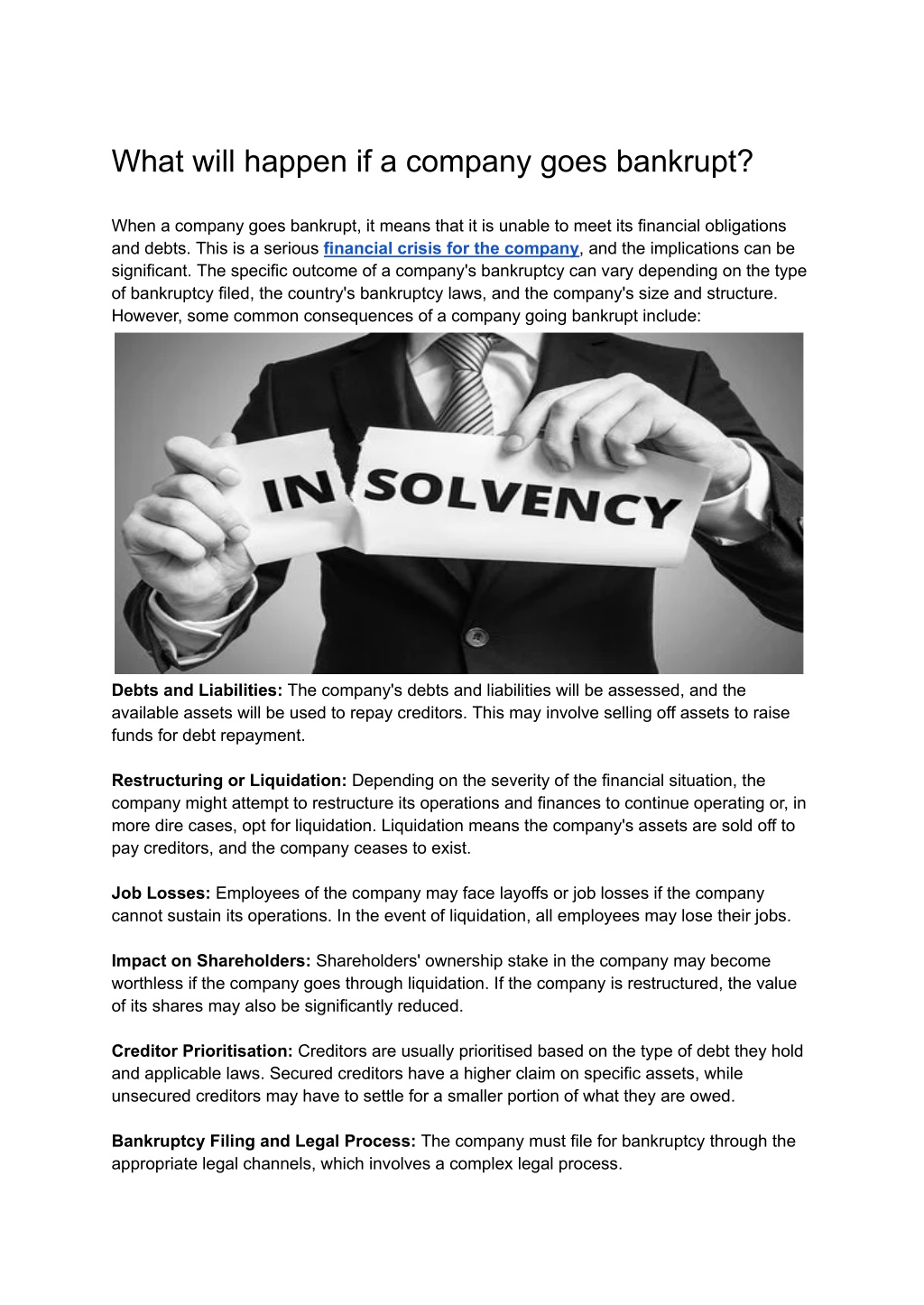Explained: Company Administration UK and What It Implies for Services
Wiki Article
Discovering the Influence of an Organization Entering Into Management

Immediate Effect on Operations
When a company goes into administration, the immediate impact on its procedures can be significant, influencing different aspects of its functioning. Partners and providers might end up being reluctant to engage with the business, influencing the supply chain and possibly creating hold-ups or lacks in important resources.Economically, the company may encounter restrictions on its spending and investment choices, as managers take control to assess the circumstance and determine the very best strategy. This can result in cash circulation challenges, making it tough to satisfy commitments such as paying earnings or settling billings quickly - what does it mean to go into administration. Additionally, the reputation of business might endure, as information of administration spreads, possibly bring about a loss of client count on and commitment
Financial Ramifications for Stakeholders
The prompt operational challenges encountered by an organization getting in administration have substantial monetary implications for stakeholders associated with the firm's events. Shareholders often bear the impact of financial losses, experiencing a decrease in the value of their investments as the firm's stock rates plummet. Employees encounter unpredictabilities concerning their incomes, advantages, and job protection, with potential discharges or lowered compensation bundles looming. Vendors may run into settlement delays or also non-payment for items or services supplied, affecting their money flow and total stability. Additionally, creditors encounter the threat of receiving just a fraction of the cash owed to them, bring about prospective losses and influencing their very own financial health. On the various other hand, clients may additionally be impacted by a service going right into administration, dealing with interruptions in service, warranty issues, or the loss of pre-paid solutions or deposits. These economic implications highlight the surge impact that a company going into management can carry different stakeholders, emphasizing the relevance of proactive threat monitoring and critical planning.Lawful Responsibilities and Responsibilities
Browsing the detailed web of lawful obligations and responsibilities is a vital endeavor for all events involved when an organization goes into administration. The managers assigned to supervise the procedure have an obligation to act in the most effective rate of interests of the creditors. They must abide with lawful needs, such as preparing reports on the business's financial circumstance and performing conferences with lenders to discuss the management procedure.Staff members additionally have legal rights that should be promoted throughout management. Depending upon the scenarios, they might be entitled to redundancy pay, notice pay, and various other advantages. It is crucial for administrators to comply with work regulations and make sure that workers are treated fairly throughout the process.
Lenders play a considerable role in administration. They have the right to be educated regarding the business's financial standing, go to creditors' conferences, and ballot on essential decisions. Administrators have to interact transparently with creditors and comply with legal protocols to guard their rate of interests.
Potential for Organization Restructuring
In the realm of business management, discovering the potential for restructuring holds substantial you can find out more pledge for renewing a having a hard time firm. When an organization encounters financial distress or operational obstacles, restructuring offers a critical approach to address underlying concerns and place the company for future success. By reflecting on the this article organizational framework, operational processes, and economic strategies, a company can apply changes that improve performance, decrease expenses, and enhance overall performance.One secret facet of company restructuring is determining and addressing ineffectiveness within the organization. This may entail streamlining processes, reallocating sources, or reviewing the services or product offering to much better line up with market needs. In addition, restructuring can involve renegotiating contracts, financial obligation responsibilities, or lease arrangements to improve capital and minimize economic pressure.
Furthermore, reorganizing provides a possibility to assess management roles, responsibilities, and decision-making processes to make sure reliable administration and accountability. By implementing a well-thought-out restructuring plan, a company can navigate difficult times and arise stronger and much more durable in the open market landscape.

Implications for Sector and Market
Thinking about the wider implications for sector and market dynamics, it becomes apparent that a service undergoing restructuring can trigger causal sequences that resound throughout the competitive landscape. When a firm enters into management, it can result in raised competitors as other companies seek to load the space left by the struggling organization. This elevated competition can cause price battles, advancement drives, or mergers and purchases as firms jostle for market share.Moreover, the collapse of a company can also influence providers and companions within the industry - what happens to employees when a company goes into liquidation. Suppliers may face settlement delays and even defaults, affecting their own economic security. Partnerships that were reliant on the now-struggling company may require to be reviewed or view it renegotiated, causing further interruptions in the marketplace ecological community
Final Thought

When a company goes right into management, the immediate effect on its procedures can be significant, influencing different facets of its working.The prompt operational difficulties dealt with by a business going into administration have considerable financial ramifications for stakeholders entailed in the business's events (what does it mean to go into administration). These financial implications highlight the ripple impact that an organization entering management can have on numerous stakeholders, underscoring the value of positive threat management and tactical preparation
When a firm goes into administration, it can lead to raised competition as other firms look for to fill the space left by the battling business.In conclusion, the effect of a service going right into administration is significant, impacting operations, funds, legal commitments, and possibly leading to restructuring.
Report this wiki page